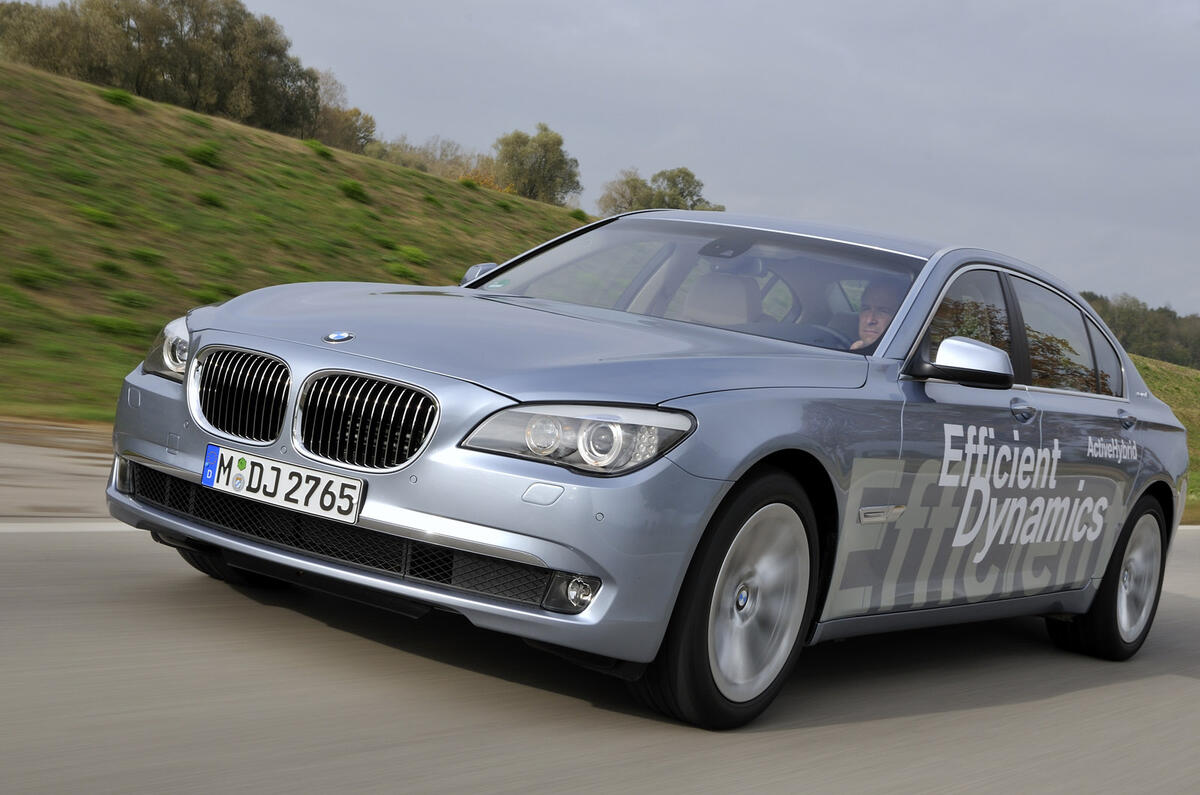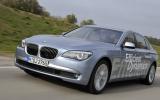What is it?
Conventional logic suggests hybrid systems are best used for their added fuel saving effect. The problem is that they only begin to make financial sense if they are applied to exclusive upper-end luxury models – the likes of which attract well-to-do customers for whom fuel efficiency is typically not an overriding priority.
Why not alter the primary focus to out-and-out performance enhancement, then? That, in essence, is the thinking behind the new BMW Active Hybrid 7.
Read more: Top 10 Best Hybrid Hatchbacks
BMW has developed two different hybrid systems. The first, used by the Active Hybrid 7, is a mild hybrid system that provides assistance to the petrol engine via an electric motor but, due to the small capacity of the battery, does not support electric-only propulsion. Rather, the petrol engine is always in operation when you are moving forwards.
Using the 750i as a basis, its twin-turbocharged 4.4-litre petrol engine gets greater boost pressure for an added 42bhp and 37lb ft, taking its output up to 444bhp and 479lb ft.
It is assisted during step-off and under light to moderate acceleration by an electric motor housed within a new eight-speed automatic gearbox. The brushless unit operates in total silence, drawing energy from a lithium ion battery mounted in the boot to take the Active Hybrid 7’s overall reserves to 459bhp and 516lb ft.
What’s it like?
Despite the advanced technology and various modifications – all of which add 100kg to the kerb weight – the Active Hybrid 7 instantly feels more muscular than the 750i, thanks to the added power and extra torque.
The upshot is a car that wafts along serenely at town speeds and can be coaxed into a rapid cruise at ridiculously low revs; the combined efforts of the petrol engine and electric motor provide the Active Hybrid 7 with enormous low-end urge and a pleasingly relaxed gait at motorway speeds that is further enhanced by the 7-series’ excellent gearing and overall refinement.
BMW’s claim that the Active Hybrid 7 boasts the performance of a V12 is fully backed up by the claimed 0-60mph time of 4.9sec, which makes it 0.3sec quicker than the 750i.
Given the performance, its combined cycle consumption of 30.1mpg and CO2 rating of 219g/km is outstanding, also bettering the 750i by 5.3mpg and 47g/km respectively in short-wheelbase guise.
The petrol engine shuts down when you brake to a standstill to conserve fuel, leaving you contemplating the silence until you step away from the brake again, at which point the big V8 bursts back to life. There’s no characteristic turbine whirl of the starter motor because there is none. Instead, the automatic stop-start function is achieved via the main electric motor.
When pushed hard over winding roads, it is clear some intimacy has been lost through the adoption of a fully electric steering system; there’s sufficient weighting but there is a spurious lack of feedback.
Otherwise, the BMW’s dynamic properties are every bit as sound as those of the 750i. Launch a spirited run on a series of corners, though, and you’re quickly reminded that the Active Hybrid 7, despite its effortless performance, is still a big, heavy car.








































Join the debate
Add your comment
Re: BMW 7 Series Active Hybrid 7
The ideal hybrid car would look like this:
propulsion with electric motors only, full recovery of kinetic energy with regenerative braking, plus a small efficient combustion engine driving a generator to make up for inevitable system losses (efficiency, friction, air resistance). As opposed to a mild hybrid, this is the hardest of all.
There are however several problems with that.
There is no such thing as full recovery of kinetic energy.
Only works in city driving unless the combustion engine is made big enough to run the car on its own. Then the electric stuff is dead weight on the highway, the oversized combustion engine is dead weight in the city. This is where we are with full hybrids.
High footprint and high price of current batteries. The more you apply, the more the pain.
Bottomline: there is no clear best solution, and a well executed mild hybrid will give you comparable performance in the city and better performance on the highway. In the end, the energy that is to be recovered and fed back is given.
Re: BMW 7 Series Active Hybrid 7
Re: BMW 7 Series Active Hybrid 7
Firstly having the money and will to buy luxury cars does not mean being unaware of and insensitive to environment issues. In better parts of the world people do not accumulate wealth by being narrow minded and arrogant.
Secondly in a lot of places hybrids do mean real cost savings even for those who don't care about fuel prices. Not sure about the UK, where I live there is a fee of around 13000£ for a 750 sort of car, and that's before applying VAT. For hybrids there is none.